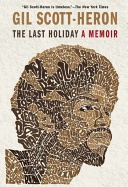
If you were young in the 1960s and '70s or were involved in one movement or another or were "black and proud" or saw the Temptations play the Apollo, you still might not know Gil Scott-Heron (although you've probably heard the title of his most famous work, "The Revolution Will Not Be Televised"). A poet, novelist and, most famously, writer of jazzy, talking, political blues, Scott-Heron died in May 2011 after a long downward spiral through crack, prison, parole and, finally, crack again. Fortunately, in 2003 he began to write a memoir chronicling his Tennessee family, his incessant drive for education and his successful music career--including a key role in Stevie Wonder's 1981 concert promoting a holiday to honor Martin Luther King Jr.'s birthday, from which The Last Holiday gets its title.
Scott-Heron was a gifted writer who understandingly depicts his parents' divorce, which sent him from Chicago to a small-town southern life with his grandmother and aunts east of Memphis. But new interstate "highways would uncoil like rattlesnakes," leading him back to his mother in the Bronx. The Last Holiday captures her dignified resolve as she pushes him into the best city schools and then into Lincoln University, where his hero Langston Hughes studied. As Scott-Heron traces his driven success in writing and music, and his participation in the civil rights movement, he remains ever humble. "I've always looked at myself as a piano player from Tennessee," he writes. "I play some piano and write some songs. The fact that I've had some political influence is all well and good, but I never considered myself a politician." Sadly, the full promise of his life--and this memoir--was cut short. --Bruce Jacobs, founding partner, Watermark Books & Cafe, Wichita, Kan.

